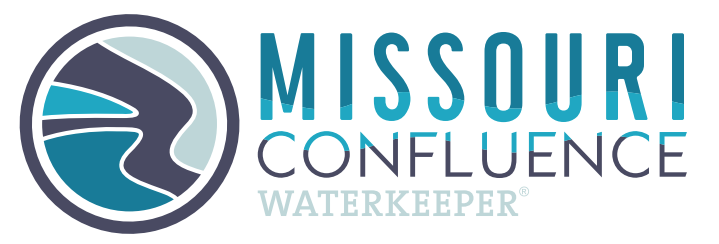Paddlers Are Paramount to Defending Missouri’s Waterways
By Elena Richards
Jumping into a local swimming hole or adventuring out to your favorite paddling spot during the summer should be the easiest decision you make all year.
In a region that boasts thousands of epic miles for kayakers, canoers, and paddleboarders to enjoy, it’s no surprise that so many committed river enthusiasts call this place home. Missouri is the Great Rivers State, after all, with the confluence of the Missouri & Mississippi Rivers in the St. Louis region making up the fourth-largest watershed in the world. And with more than 258,000 miles of rivers and streams flowing throughout our state, and 900,000 acres of lakes for people to explore, Missourians have amazing opportunities to explore outdoors.
But pollution and lack of water testing threaten these waterways and our ability to enjoy them. According to the CDC, water recreators have higher rates of acute gastrointestinal illness and respiratory, ear, eye, and skin symptoms. Many of these illnesses are caused by water polluted with bacteria from sewage leaks, runoff, and fertilizers, or by chemical pollution from industrial operations. The fact is, when not cared for properly, the same water we enjoy can make us sick.
The Clean Water Act specifies that all waters should be swimmable and fishable; meaning rivers, lakes, and streams should meet minimum water quality standards to prevent direct health impacts to users. Yet according to the EPA, over 40% of U.S. rivers and streams are unsafe for fishing, swimming, or drinking, as are almost half of all lakes. Clean water protections are being rolled back at the state and federal levels, and budgets for water testing programs are frequently slashed.
But most concerning is that millions of people recreate in bodies where a water quality sample has never been taken. In Missouri, only around 3% of streams are regularly tested for contamination. And even when data is collected, the critical results—whether it’s safe to swim—are often not readily available to the public.
That’s where organizations like Missouri Confluence Waterkeeper and Missouri Stream Teams come in, helping connect clean water policy to the people using the waterways. Both are citizen-led conservation groups focused on creating clean and healthy waterways.
“As your local Waterkeeper, we are out on the rivers testing water quality, investigating pollution and identifying problems,” said Rachel Bartels, Missouri Confluence Waterkeeper. “If we or one of our network discovers an issue impacting the waterway, we work collaboratively to address its source and advocate for compliance with clean water laws.”
This grassroots network is made up of kayakers, fishermen, boaters, and “backyard scientists” who play as the eyes and ears of the river. Today, anyone who regularly engages with local waterways can help protect them with the click of a button. Pollution issues can be reported through Missouri Confluence Waterkeeper’s website, by calling their hotline, or using the Water Reporter app to note changes and observations at usual recreation spots.
And, this summer, Missouri Confluence Waterkeeper is expanding its water quality testing program to include weekly samples at popular sites in the Missouri and Meramec River watersheds. The results will be posted on the Swim Guide, a free app and website that allows users to know whether their favorite swimming or paddling spot is clean and safe to recreate.
These programs need volunteers, and outdoor enthusiasts are in a unique position to help while doing things they already love. Protecting clean water can mean signing up for a microplastics or water monitoring program, or it can be as simple as attending a river cleanup or spreading the word about a legislative issue.
“As a fellow Stream Teamer and a member of several recreational paddling groups who thrive on clean water, we have a responsibility to protect our rivers,” said Melanie Cheney who also works for Missouri River Relief. “I've always appreciated getting an immediate response from Missouri DNR when reporting environmental concerns I come across, and it’s great to be allies with our local Waterkeeper as well.”
“As outdoor enthusiasts, we rely on the water, and the water relies on us,” said Bartels. “Educating people about issues that impact our shared water is becoming more and more important. This work is crucial to making sure our communities’ health is protected, as well as the freedom to enjoy the places we love.”
Missouri’s waterways connect us, support life, provide recreation, and what’s more, they nourish our spirits. Protecting these incredible resources should be the next easiest decision.

